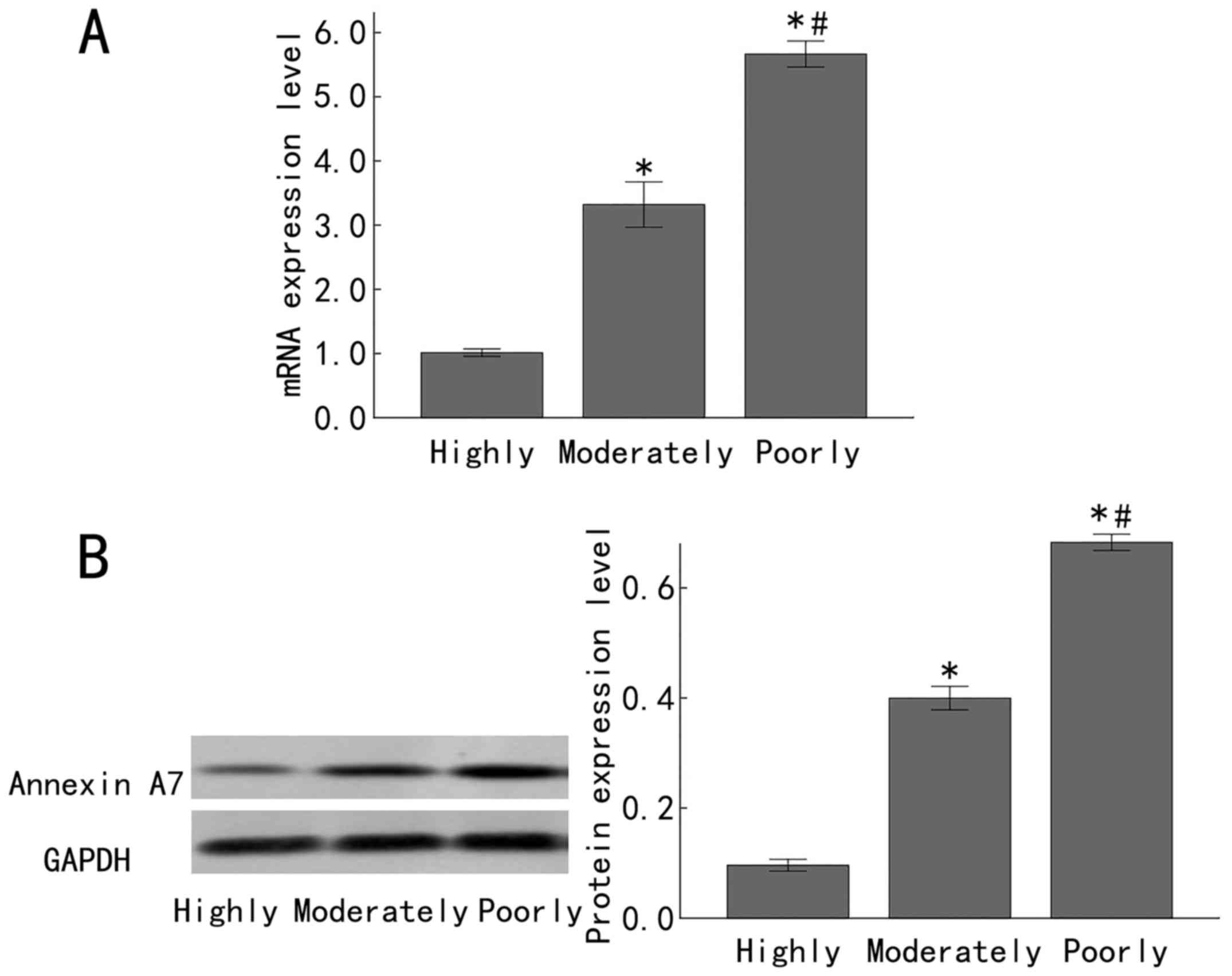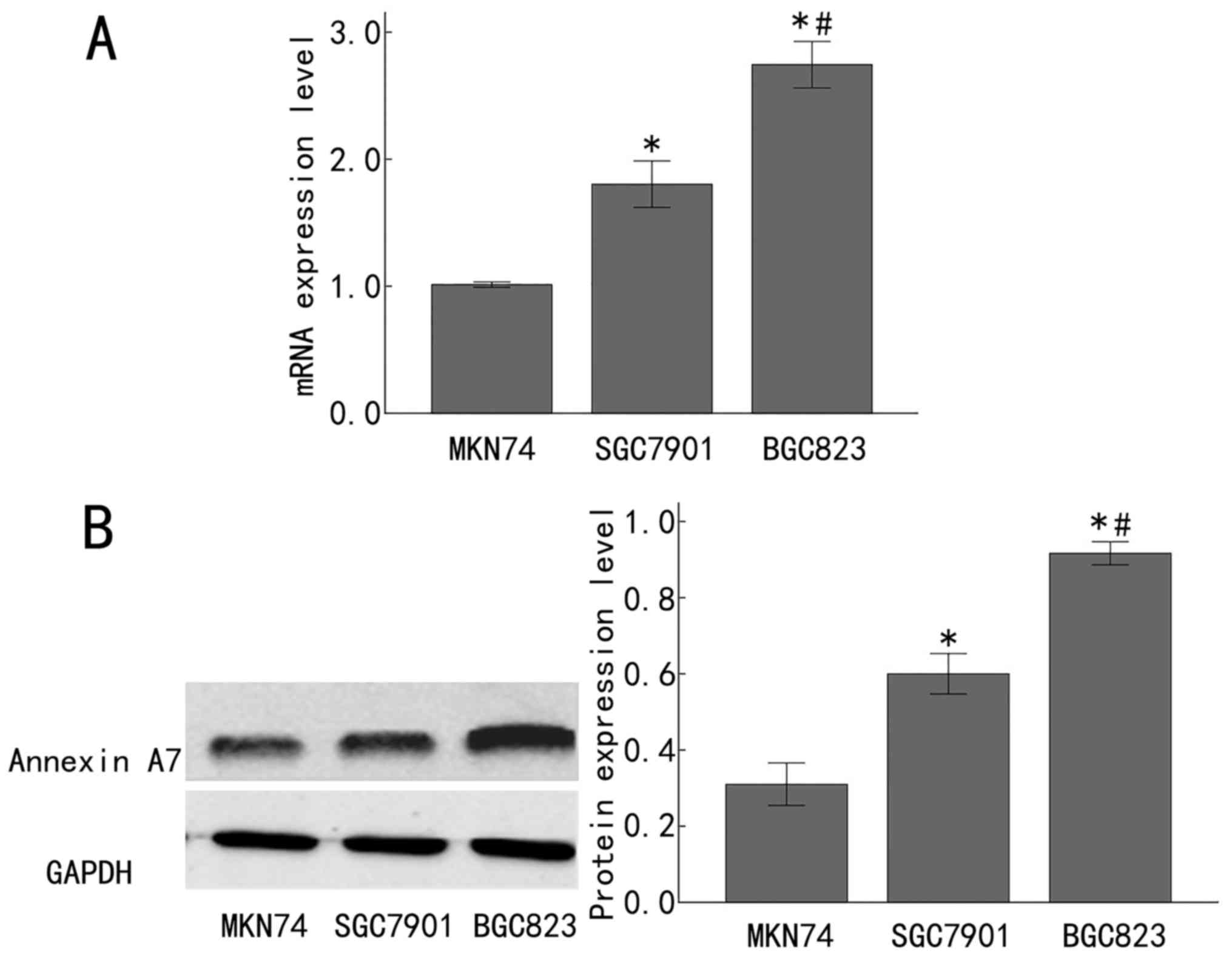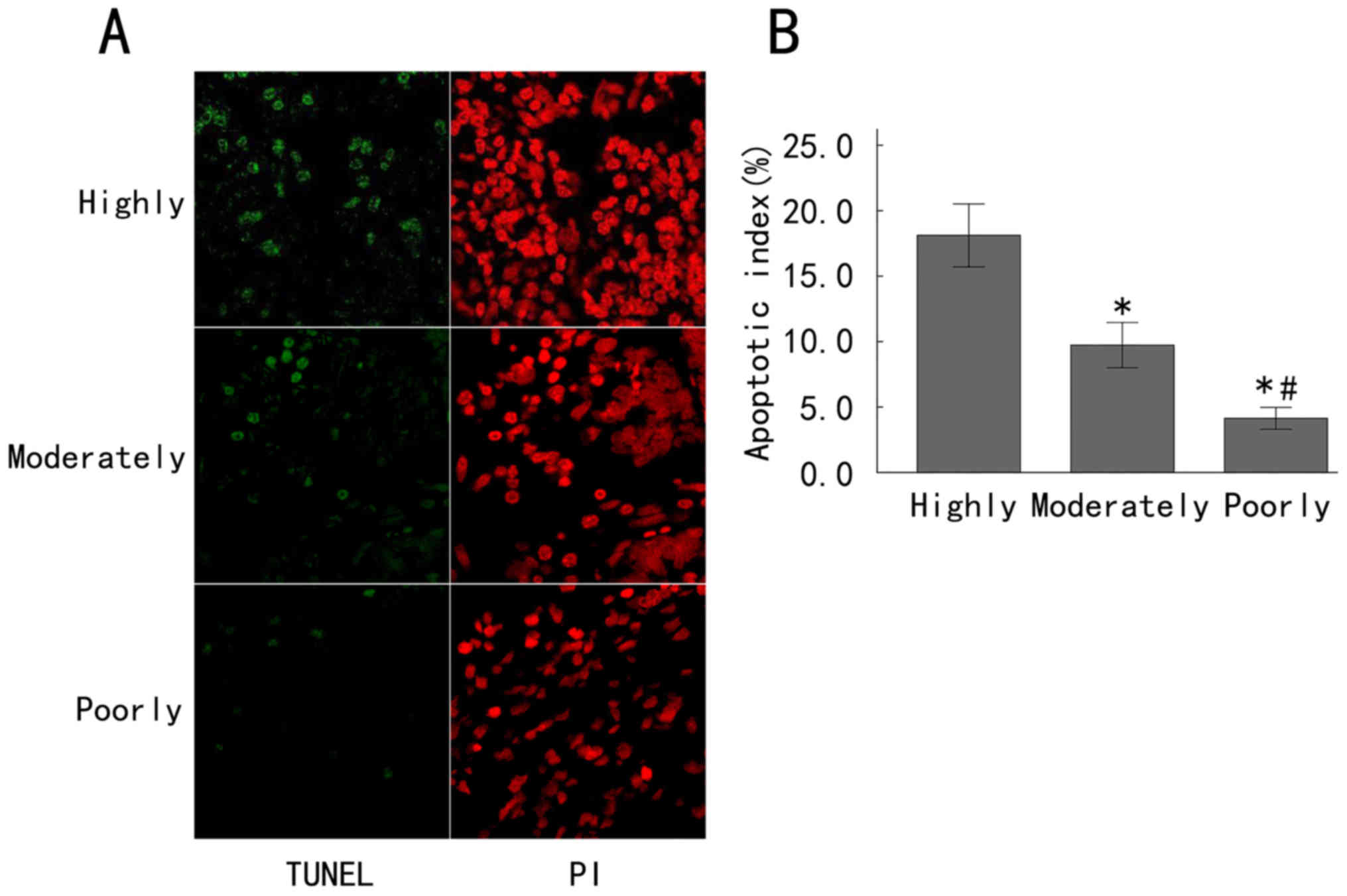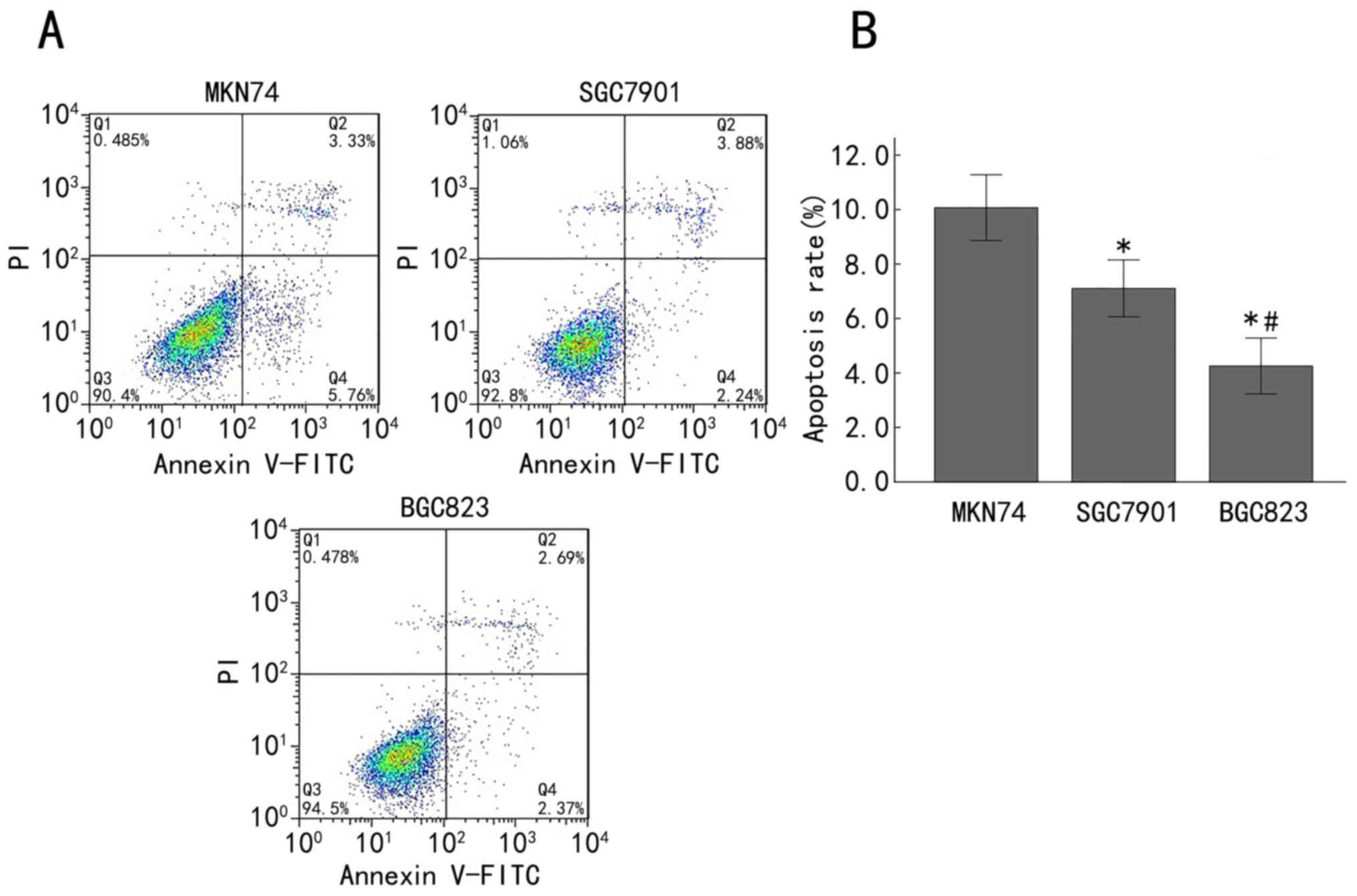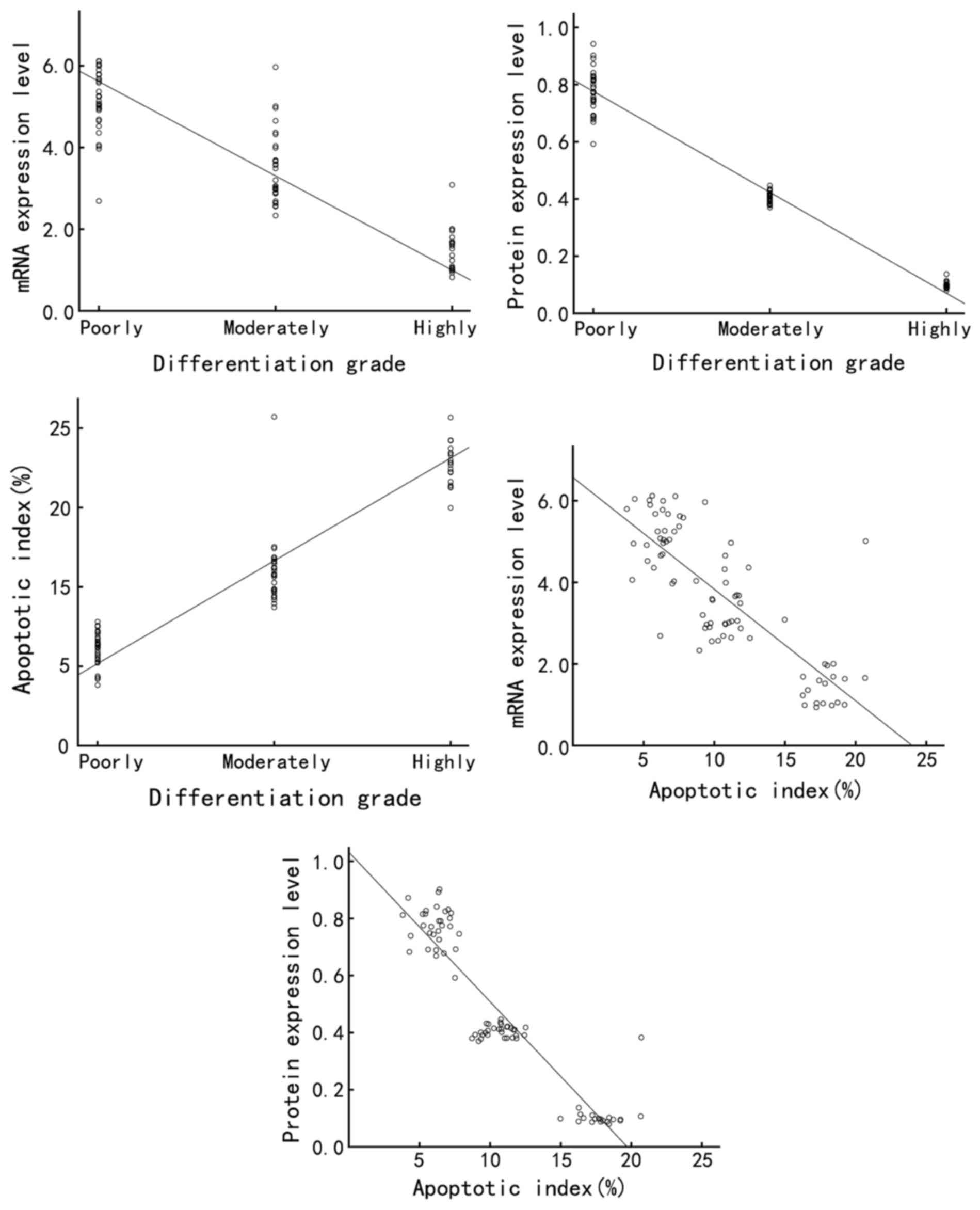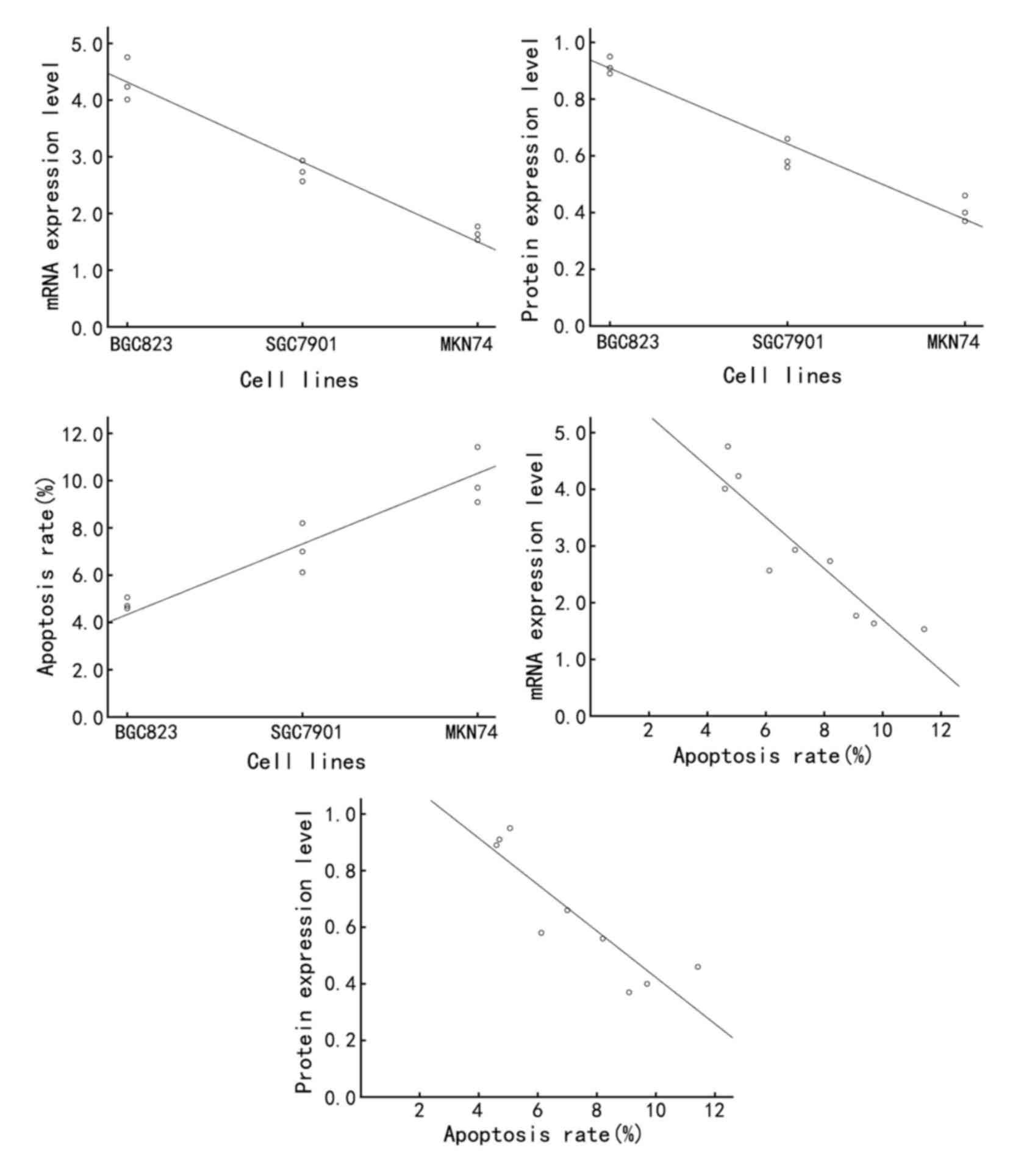|
1
|
Chen W, Zheng R, Baade PD, Zhang S, Zeng
H, Bray F, Jemal A, Yu XQ and He J: Cancer statistics in China,
2015. CA Cancer J Clin. 66:115–132. 2016. View Article : Google Scholar : PubMed/NCBI
|
|
2
|
Monastyrskaya K, Babiychuk EB and Draeger
A: The Annexins: Spatial and temporal coordination of signaling
events during cellular stress. Cell Mol Life Sci. 66:2623–2642.
2009. View Article : Google Scholar : PubMed/NCBI
|
|
3
|
Gerke V and Moss SE: Annexins: From
structure to function. Physiol Rev. 82:331–371. 2002. View Article : Google Scholar : PubMed/NCBI
|
|
4
|
Gerke V, Creutz CE and Moss SE: Annexins:
Linking Ca2+ signalling to membrane dynamics. Nat Rev Mol Cell
Biol. 6:449–461. 2005. View
Article : Google Scholar : PubMed/NCBI
|
|
5
|
Wang KL, Wu TT, Resetkova E, Wang H,
Correa AM, Hofstetter WL, Swisher SG, Ajani JA, Rashid A, Hamilton
SR and Albarracin CT: Expression of Annexin A1 in esophageal and
esophagogastric junction adenocarcinomas: Association with poor
outcome. Clin Cancer Res. 12:4598–4604. 2006. View Article : Google Scholar : PubMed/NCBI
|
|
6
|
Yan GR, Ding W, Xu SH, Xu Z, Xiao CL, Yin
XF and He QY: Characterization of phosphoproteins in gastric cancer
secretome. OMICS. 15:83–90. 2011. View Article : Google Scholar : PubMed/NCBI
|
|
7
|
Lauritzen SP, Boye TL and Nylandsted J:
Annexins are instrumental for efficient plasma membrane repair in
cancer cells. Semin Cell Dev Biol. 45:32–38. 2015. View Article : Google Scholar : PubMed/NCBI
|
|
8
|
Han Y, Ye J, Dong Y, Xu Z and Du Q:
Expression and significance of Annexin A2 in patients with gastric
adenocarcinoma and the association with E-cadherin. Exp Ther Med.
10:549–554. 2015. View Article : Google Scholar : PubMed/NCBI
|
|
9
|
Creutz CE, Pazoles CJ and Pollard HB:
Identification and purification of an adrenal medullary protein
(synexin) that causes calcium-dependent aggregation of isolated
chromaffin granules. J Biol Chem. 253:2858–2866. 1978.PubMed/NCBI
|
|
10
|
Selbert S, Fischer P, Pongratz D, Stewart
M and Noegel AA: Expression and localization of Annexin VII
(synexin) in muscle cells. J Cell Sci. 108:85–95. 1995.PubMed/NCBI
|
|
11
|
Clemen CS, Hofmann A, Zamparelli C and
Noegel AA: Expression and localisation of Annexin VII (synexin)
isoforms in differentiating myoblasts. J Muscle Res Cell Motil.
20:669–679. 1999. View Article : Google Scholar : PubMed/NCBI
|
|
12
|
Fatimathas L and Moss SE: Annexins as
disease modifiers. Histol Histopathol. 25:527–532. 2010.PubMed/NCBI
|
|
13
|
Huang Y, Du Y, Zhang X, Bai L, Mibrahim M,
Zhang J, Wei Y, Li C, Fan S, Wang H, et al: Down-regulated
expression of Annexin A7 induces apoptosis in mouse hepatocarcinoma
cell line by the intrinsic mitochondrial pathway. Biomed
Pharmacother. 70:146–150. 2015. View Article : Google Scholar : PubMed/NCBI
|
|
14
|
Song MY, Tang JW, Sun MZ, Liu SQ and Wang
B: Localization and expression of CLIC1 in hepatocarcinoma ascites
cell lines with high or low potentials of lymphatic spread.
Zhonghua Bing Li Xue Za Zhi. 39:463–466. 2010.(In Chinese).
PubMed/NCBI
|
|
15
|
Srivastava M, Montagna C, Leighton X,
Glasman M, Naga S, Eidelman O, Ried T and Pollard HB:
Haploinsufficiency of Anx7 tumor suppressor gene and consequent
genomic instability promotes tumorigenesis in the Anx7(+/-) mouse.
Proc Natl Acad Sci USA. 100:14287–14292. 2003. View Article : Google Scholar : PubMed/NCBI
|
|
16
|
Srivastava M, Torosyan Y, Raffeld M,
Eidelman O, Pollard HB and Bubendorf L: ANXA7 expression represents
hormone-relevant tumor suppression in different cancers. Int J
Cancer. 121:2628–2636. 2007. View Article : Google Scholar : PubMed/NCBI
|
|
17
|
Yadav AK, Renfrow JJ, Scholtens DM, Xie H,
Duran GE, Bredel C, Vogel H, Chandler JP, Chakravarti A, Robe PA,
et al: Monosomy of chromosome 10 associated with dysregulation of
epidermal growth factor signaling in glioblastomas. JAMA.
302:276–289. 2009. View Article : Google Scholar : PubMed/NCBI
|
|
18
|
Hung KS and Howng SL: Prognostic
significance of Annexin VII expression in glioblastomas multiforme
in humans. J Neurosurg. 99:886–892. 2003. View Article : Google Scholar : PubMed/NCBI
|
|
19
|
Kataoka TR, Ito A, Asada H, Watabe K,
Nishiyama K, Nakamoto K, Itami S, Yoshikawa K, Ito M, Nojima H and
Kitamura Y: Annexin VII as a novel marker for invasive phenotype of
malignant melanoma. Jpn J Cancer Res. 91:75–83. 2000. View Article : Google Scholar : PubMed/NCBI
|
|
20
|
Torosyan Y, Dobi A, Glasman M, Mezhevaya
K, Naga S, Huang W, Paweletz C, Leighton X, Pollard HB and
Srivastava M: Role of multi-hnRNP nuclear complex in regulation of
tumor suppressor ANXA7 in prostate cancer cells. Oncogene.
29:2457–2466. 2010. View Article : Google Scholar : PubMed/NCBI
|
|
21
|
Hsu PI, Huang MS, Chen HC, Hsu PN, Lai TC,
Wang JL, Lo GH, Lai KH, Tseng CJ and Hsiao M: The significance of
ANXA7 expression and its correlation with poor cellular
differentiation and enhanced metastatic potential of gastric
cancer. J Surg Oncol. 97:609–614. 2008. View Article : Google Scholar : PubMed/NCBI
|
|
22
|
Yang M and Liang Q: Study the relationship
between the expression of Annexin A7 and CT of nasopharyngeal
carcinoma. J Chin Clin Med Imaging. 22:6–9. 2011.
|
|
23
|
Alfonso P, Canamero M, Fernández-Carbonié
F, Núñez A and Casal JI: Proteome analysis of membrane fractions in
colorectal carcinomas by using 2D-DIGE saturation labeling. J
Proteome Res. 7:4247–4255. 2008. View Article : Google Scholar : PubMed/NCBI
|
|
24
|
Chen X, Gao FL, Chang YZ and Li X:
Expression of Annexin A7 in human uterine cervical squamous
carcinomas and normal tissues. Acta Anatomica Sinica. 41:603–605.
2010.
|
|
25
|
Leighton X, Srikantan V, Pollard HB,
Sukumar S and Srivastava M: Significant allelic loss of ANX7region
(10q21) in hormone receptor negative breast carcinomas. Cancer
Lett. 210:239–244. 2004. View Article : Google Scholar : PubMed/NCBI
|
|
26
|
Yuan HF, Li Y, Zhao Q, Fan LQ, Tan BB and
Ye WH: Expression of Annexin A7 and its clinical significance in
differentiation and metastasis of gastric carcinoma. Int J Clin Exp
Pathol. 7:6567–6574. 2014.PubMed/NCBI
|
|
27
|
Livak KJ and Schmittgen TD: Analysis of
relative gene expression data using real-time quantitative PCR and
the 2(-Delta Delta C(T)) method. Methods. 25:402–408. 2001.
View Article : Google Scholar : PubMed/NCBI
|
|
28
|
Karube A, Shidara Y, Hayasaka K, Maki M
and Tanaka T: Suppression of calphobindin I (CPB I) production in
carcinoma of uterine cervix and endometrium. Gynecol Oncol.
58:295–300. 1995. View Article : Google Scholar : PubMed/NCBI
|
|
29
|
Kanat O, O'Neil B and Shahda S: Targeted
therapy for advanced gastric cancer: A review of current status and
future prospects. World J Gastrointest Oncol. 7:401–410. 2015.
View Article : Google Scholar : PubMed/NCBI
|
|
30
|
Xi JM and Zhao Q: Expression of Annexin A7
in gastric cancer tissues and their effects on the differentiation
and metastasis of gastric cancer. J Exp Clin Med. 9:726–727.
2010.
|
|
31
|
Gong X, Tang J and Geng X: Expression and
significance of Annexin 7 in gastric cancer and lymphatic
metastasis. Inter J Pathol Clin Med. 29:369–373. 2009.
|
|
32
|
Giansanti V, Torriglia A and Scovassi AI:
Conversation between apoptosis and autophagy: ‘Is it your turn or
mine?’. Apoptosis. 16:321–333. 2011. View Article : Google Scholar : PubMed/NCBI
|















